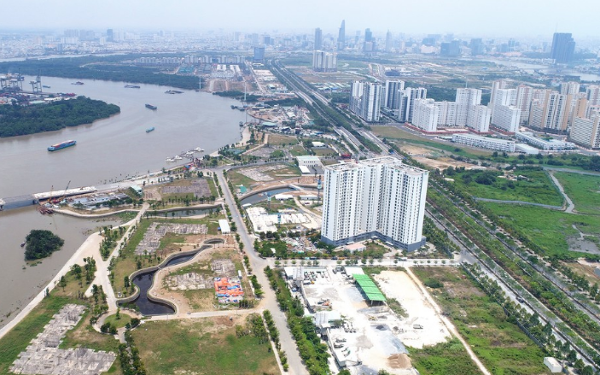14-Year Legal Vacuum on “Land Use Plans”
Mr. Le Hoang Chau, Chairman of the Ho Chi Minh City Real Estate Association (HoREA), announced that the association has proposed the National Assembly’s Standing Committee, the National Assembly’s Economic and Financial Committee, and relevant ministries (Agriculture and Environment, Finance, Justice) to add clause 2a after clause 2 of Article 10 in the “Draft Resolution of the National Assembly on mechanisms and policies to address difficulties in implementing the Land Law.”
The goal is to untangle bottlenecks for businesses privatized from state-owned enterprises that have not established land use plans or have plans that do not comply with regulations between 2007 and 2021.
According to HoREA, Ho Chi Minh City has over 1,000 privatized enterprises, most of which manage land originally owned by the state before privatization. However, for years, procedures related to land, such as extensions and land use conversions, have lacked unified regulations, leading to confusion in implementation.

HoREA proposes solutions for land use conversion issues in privatized state-owned enterprises. Illustrative image.
Overlapping legal provisions have made authorities hesitant to approve or resolve cases due to fears of legal risks. As a result, numerous land plots owned by privatized enterprises remain underutilized, leading to resource wastage.
A notable example is Saigon 5 Real Estate Development JSC, a privatized state-owned enterprise with 99.7% state ownership. Due to unclear legal grounds, the company has been unable to utilize its land for project development for years.
HoREA highlights that before 2007, when Decree 109/2007/NĐ-CP was issued, there were no legal requirements for establishing “land use plans” during privatization. From 2007 to 2021, although the regulation existed, detailed guidelines were absent.
It was not until Decree 140/2020/NĐ-CP and Circular 03/2021/TT-BTNMT were issued that the Ministry of Natural Resources and Environment provided specific guidance on creating and approving “land use plans.”
Consequently, nearly all state-owned enterprises privatized between 2007 and 2021 lack approved “land use plans.”
Law Permits, but Reality Doesn’t Allow
According to HoREA, the 2024 Land Law grants land users, including privatized enterprises, the right to convert land use purposes as per the law and related regulations.
However, there are varying interpretations regarding whether privatized state-owned enterprises can convert land use purposes to meet production and business development needs.
The association notes that due to the lack of specific provisions in the 2024 Land Law and its implementing decrees, local authorities are hesitant to process land use conversion requests from privatized state-owned enterprises. This has prevented efficient land utilization, resulting in resource wastage.
In many cases, land plots of privatized enterprises have purposes defined by outdated plans that no longer align with current needs. While enterprises seek adjustments to new plans approved by competent authorities, these differ from previous “land use plans” or lack such plans altogether. Some argue that this “public land” should be reclaimed for auction.
HoREA disagrees, stating that privatized enterprises base their actions on approved plans and fulfill financial obligations when converting land use purposes, ensuring no loss of public assets or state budget revenue.
Mr. Le Hoang Chau, HoREA Chairman, emphasized that adding this provision to the “Draft Resolution” aims to provide a legal framework for state officials handling land procedures, unlock land resources for socio-economic development, and resolve long-standing land use issues for privatized state-owned enterprises from 2007 to 2021.
This measure also generates budget revenue through financial obligation recovery mechanisms, curbs unauthorized claims on public land without auctions or bids, and safeguards the legal rights and interests of privatized state-owned enterprises using land in accordance with approved plans.
The Government Office recently issued a document to the Minister of Agriculture and Environment, conveying the Prime Minister’s directive regarding media reports on over 1,000 privatized state-owned enterprises in Ho Chi Minh City facing land use issues related to state-managed land before privatization. The Prime Minister has requested the Minister to report on this matter.
Unlocking Land Access: The Critical Bottleneck Stalling Industrial Zone Projects
Attorney Bùi Văn Thành highlights that the most significant bottleneck remains in land acquisition. The 2024 Land Law mandates the state to handle land reclamation and clearance for industrial zone projects. However, in practice, negotiating with local residents continues to be extremely challenging.
Navigating Land Use Purpose Conversion: Key Considerations and Solutions
Delegates proposed that the conversion fee for residential land should be calculated based on the state-regulated price framework, rather than market rates.




















